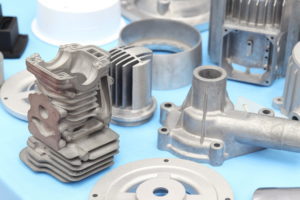Stahl Specialty Company Fundamentals Explained
Stahl Specialty Company Fundamentals Explained
Blog Article
The Best Strategy To Use For Stahl Specialty Company
Table of ContentsThings about Stahl Specialty CompanyThe Stahl Specialty Company DiariesThe Single Strategy To Use For Stahl Specialty CompanyThe Facts About Stahl Specialty Company RevealedWhat Does Stahl Specialty Company Do?
Chemical Contrast of Cast Aluminum Alloys Silicon advertises castability by minimizing the alloy's melting temperature and enhancing fluidness throughout spreading. Additionally, silicon contributes to the alloy's toughness and use resistance, making it valuable in applications where toughness is vital, such as automobile components and engine elements.It also boosts the machinability of the alloy, making it easier to process into completed items. In this method, iron adds to the general workability of light weight aluminum alloys. Copper increases electric conductivity, making it advantageous in electric applications. It likewise improves rust resistance and contributes to the alloy's general toughness.
Manganese contributes to the strength of aluminum alloys and boosts workability. It is typically utilized in functioned light weight aluminum items like sheets, extrusions, and profiles. The visibility of manganese help in the alloy's formability and resistance to breaking during fabrication procedures. Magnesium is a light-weight element that provides toughness and impact resistance to aluminum alloys.
Zinc improves the castability of aluminum alloys and helps regulate the solidification process during casting. It boosts the alloy's toughness and firmness.
The 6-Second Trick For Stahl Specialty Company
Due to the fact that aluminum-silicon alloys have good casting residential properties, high gas homes, easy processes, and excellent corrosion resistance, aluminum-silicon alloys are most frequently used in the die-casting market in your home and abroad. At the same time, aluminum-silicon alloys are additionally fairly early and widely identified alloys established and used in die-casting. After continual research study and improvement, most of the current global mainstream aluminum-silicon alloys have actually been settled and are nothing greater than A356, A360, A380, ADC12, B390, and A413.
The main thermal conductivity, tensile toughness, yield toughness, and prolongation vary. Select ideal basic materials according to the efficiency of the target item produced. Among the above alloys, A356 has the highest thermal conductivity, and A380 and ADC12 have the most affordable. The tensile limitation is the contrary. A360 has the very best return strength and the greatest elongation price.

Stahl Specialty Company Can Be Fun For Everyone
In precision see this casting, 6063 is well-suited for applications where detailed geometries and high-quality surface area finishes are critical. Instances include telecommunication rooms, where the alloy's premium formability enables smooth and visually pleasing layouts while keeping architectural integrity. In the Lighting Solutions market, precision-cast 6063 components create stylish and reliable lighting components that require elaborate shapes and great thermal performance.
(https://www.easel.ly/browserEasel/14544517)
It results in a finer surface area coating and better rust resistance in A360. Furthermore, the A360 shows superior prolongation, making it suitable for complicated and thin-walled parts. In precision casting applications, A360 is well-suited for industries such as Consumer Electronics, Telecommunication, and Power Devices. Casting Foundry. Its improved fluidity permits for elaborate, high-precision parts like mobile phone cases and interaction device housings.

In accuracy casting, aluminum 413 shines in the Consumer Electronic Devices and Power Equipment markets. This alloy's remarkable deterioration resistance makes it a superb choice for exterior applications, guaranteeing durable, durable products in the mentioned industries.
7 Simple Techniques For Stahl Specialty Company
The aluminum alloy you choose will substantially impact both the casting process and the residential properties of the final item. Due to the fact that of this, you must make your decision thoroughly and take an educated approach.
Identifying the most ideal aluminum alloy for your application will certainly suggest evaluating a vast array of features. These comparative alloy features follow the North American Pass Away Casting Association's standards, and we've separated them right into 2 categories. aluminum metal casting. The initial group addresses alloy characteristics that affect the manufacturing procedure. The second covers characteristics affecting the buildings of the last product.
The alloy you choose for die casting straight impacts numerous aspects of the casting process, like just how very easy the alloy is to work with and if it is prone to casting flaws. Hot breaking, additionally known as solidification fracturing, is a regular die spreading defect for aluminum alloys that can cause internal or surface-level tears or cracks.
The Basic Principles Of Stahl Specialty Company
Particular light weight aluminum alloys are a lot more prone to warm fracturing than others, and your choice must consider this. One more common flaw discovered in the die spreading of light weight aluminum is pass away soldering, which is when the cast stays with the die walls and makes ejection hard. It can damage both the actors and the die, so you ought to seek alloys with high anti-soldering residential or commercial properties.
Rust resistance, which is already a noteworthy characteristic of light weight aluminum, can differ considerably from alloy to alloy and is an essential particular to consider depending on the environmental conditions your item will be subjected to. Use resistance is one more property typically sought in aluminum items and can distinguish some alloys.
Report this page